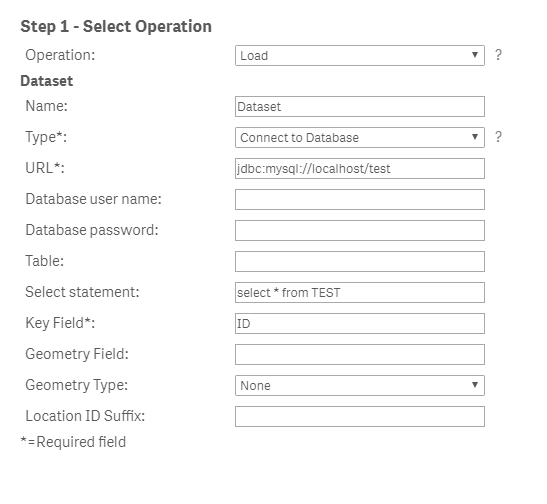Connecting Qlik GeoAnalytics Plus to a local database
This page describes how you connect to a local database with GeoAnalytics Plus.
- If it not already done, find the ODBC driver jar needed to connect to your database.
-
Put the jar in the folder similar to (depending on windows installation):
C:\Program Files\Common Files\Qlik\Custom Data\QvIdevioConnector\lib\driver
(prior to GeoAnalytics 1.5.3, put it in the lib folder)
-
In Qlik open the GeoAnalytics ‘Select Data’.

- Select Dataset Type ‘Connect to Database’.
- The URL should contain the connection string for the database. It starts with jdbc: and then contain the type of database and name of database. For examples of common formats see Connection string examples for common databases.
- If the database needs any username or password you can put them in the respective field.
- The connector can either get all data in a specific table or get the result data from a select statement. Only one needs to be chosen.
- The ‘Key field’ should contain the name of the column that contain the primary id of the table or the result. If left blank, a key column is generated.
- The name of the geometry column should be given in ‘Geometry Field’ together with the type of geometry in ‘Geometry Type’. If there are no geometries in the result, set the ‘Geometry Type’ to None.
Common JDBC drivers
You can find drivers for your database here:
Connection string examples for common databases
-
IBM DB2
jdbc:db2://<HOST>:<PORT>/<DB>
-
JDBC-ODBC Bridge (Note only available if you have java 1.7 installed)
jdbc:odbc:<DB>
-
Microsoft SQL Server
jdbc:weblogic:mssqlserver4:<DB>@<HOST>:<PORT>
-
Oracle Thin
jdbc:oracle:thin:@<HOST>:<PORT>:<SID>
-
PointBase Embedded Server
jdbc:pointbase://embedded[:<PORT>]/<DB>
-
Cloudscape
jdbc:cloudscape:<DB>
-
Cloudscape RMI
jdbc:rmi://<HOST>:<PORT>/jdbc:cloudscape:<DB>
-
Firebird (JCA/JDBC Driver)
jdbc:firebirdsql:[//<HOST>[:<PORT>]/]<DB>
-
IDS Server
jdbc:ids://<HOST>:<PORT>/conn?dsn='<ODBC_DSN_NAME>'
-
Informix Dynamic Server
jdbc:informix-sqli://<HOST>:<PORT>/<DB>:INFORMIXSERVER=<SERVER_NAME>
-
InstantDB (v3.13 and earlier)
jdbc:idb:<DB>
-
InstantDB (v3.14 and later)
jdbc:idb:<DB>
-
Interbase (InterClient Driver)
jdbc:interbase://<HOST>/<DB>
-
Hypersonic SQL (v1.2 and earlier)
jdbc:HypersonicSQL:<DB>
-
Hypersonic SQL (v1.3 and later)
jdbc:HypersonicSQL:<DB>
-
Microsoft SQL Server (JTurbo Driver)
jdbc:JTurbo://<HOST>:<PORT>/<DB>
-
Microsoft SQL Server (Sprinta Driver)
jdbc:inetdae:<HOST>:<PORT>?database=<DB>
-
Microsoft SQL Server 2000 (Microsoft Driver)
jdbc:microsoft:sqlserver://<HOST>:<PORT>[;DatabaseName=<DB>]
-
MySQL (MM.MySQL Driver)
jdbc:mysql://<HOST>:<PORT>/<DB>
-
Oracle OCI 8i
jdbc:oracle:oci8:@<SID>
-
Oracle OCI 9i
jdbc:oracle:oci:@<SID>
-
PostgreSQL (v6.5 and earlier)
jdbc:postgresql://<HOST>:<PORT>/<DB>
-
PostgreSQL (v7.0 and later)
jdbc:postgresql://<HOST>:<PORT>/<DB>
-
Sybase (jConnect 4.2 and earlier)
jdbc:sybase:Tds:<HOST>:<PORT>
-
Sybase (jConnect 5.2)
jdbc:sybase:Tds:<HOST>:<PORT>
